- Home
- Ian McDonald
Be My Enemy Page 2
Be My Enemy Read online
Page 2
“You need a break.”
“I got us into this. I have to get us out.”
“How you going to do that if you's seeing all them bijou letters double? Take a break with Sen.”
Everett had to admit that he needed a break. He had been up long before the dawn turned the great ice red, even before Ship's Engineer Mchynlyth, a famous bright and early riser. He had brought Captain Anastasia Sixsmyth her breakfast in her latty. When he knocked, she answered with bleary eyes, muffled up in three cardigans and bedsocks, frowning. For once she hadn't seemed overjoyed to see a plate of his cooking. Everett might be planesrunner, head coder, and the only way of getting Everness and her crew off this random parallel Earth, wherever in the Panoply of the multiverse it might be, but he was also ship's cook. The Airish, Captain Anastasia constantly reminded him, were a people of appetite.
“Mchynlyth's got the snipships to work. Wanna take a varda?” Sen asked.
Everett wanted very much to take a look at the drones. When he had pulled the trigger on the stolen jumpgun and dropped Everness out from under the guns and fighters of Charlotte Villiers and the Royal Air Navy into a random parallel Earth, everything inside the Heisenberg field had gone with them. Including two state-of-the-art Royal Air Navy remote drones—snipships connected by an invisibly thin but incredibly strong nanocarbon filament. Moving as a team they could use the nanocarbon monofilament line like a cheese wire to slice off Everness's impeller pods and carve her up like a Christmas goose nineteen different ways. Cut off from their mother ship in another universe, they had gone into automatic hover mode. For the first two days, Everness's crew had been too busy working out where they were to notice what else had come through the Heisenberg gate with them.
“Well, I'm not leaving good Royal Navy technology sitting out there dish deep in snow for whoever comes trolling along,” Mchynlyth declared. Until he said that, no one had thought that there could be a “whoever,” out there. He had trudged out with First Officer Sharkey through the shrieking, scurrying snow. The cold was so intense that his fingertips flash-froze to the metal. In the six days they had been in Engineering, Mchynlyth had taken them apart and rebuilt them to his own specifications.
Sen was already halfway to the central staircase. She looked over her shoulder.
“You coming, omi?”
Everness trembled. Sen seized the handrail. Everett pushed his technology to the safe side of the table. The vibration was deep and huge; every part of the ship and everyone on her was shaken to the core.
“I hates it when it does that,” Sen declared. Since tying down in its mooring, the ship had been shaken by irregular but deep tremors. Not from Everness herself, but from deep in the ice. “What's doing it?”
“How would I know?” Everett said.
“You's the scientist.”
“Yes, but….” There was no arguing with Sen. “Let's go.”
“I bets its some big ice monster, deep down there,” Sen said. Everett thought a moment about explaining how scientifically unlikely it was that a giant monster could exist in the ice. Pointless. At least there might be some heat in Mchynlyth's dim, electricity-smelling, junk-stuffed cubbyhole.
It was the eighth day of Christmas, on the great ice that in another universe was the North Sea, twenty aerial miles from the airspace of High Deutschland. In the Airish version of the song, on that day my true love gave to me “eight breezes blowing.” Wind, hard, unceasing, and icy, had been a constant since Everett had triggered the Heisenberg jump into this white world. Wind shrilling over the hull with a hiss like knives. Wind drawing long moans like the songs of alien whales from the guy lines. Wind pulling and tugging and worrying at every rough or protruding feature, ice fingers seeking for something they could hold on to, work at, tear free, and strew across the ice. Wind shaking Everness like a dog with a rat as Captain Anastasia navigated her away from the jump point. If Everett's theory was correct—that every Heisenberg jump left a trail behind it—she didn't want special forces dispatched by the Order arriving on top of them, or even inside the ship. E3's Heisenberg Gate technology was sophisticated enough to follow that trail and open a jump point right on the bridge. The wind shrieked over the hull as Everett made Christmas dinner up in the galley, every pan and pot and piece of cutlery rattling as he skinned and gutted the pheasants and made naan dough. Everness held her nanocarbon skin close and tight against the icy wind. Captain Anastasia had brought her down to a handful of meters above the great ice. Mooring lines, driven hard into thirty thousand years of ice, held the airship against the titanic draft of air rushing down out of the north. Everness creaked and strained and shivered at her anchors, but the anchors held.
“Now,” Captain Anastasia declared, “we eat.”
Everett carried the red gold and green saris he had bought from Ridley Road Market back in Hackney Great Port to the tiny galley table and spread them out. He lit little candles in empty jars. Sharkey gave a long and magnificent grace in the thunderous language of the Old Testament. Then Everett served: pheasant makhani with saffron rice and naan bread, which he puffed up on the end of a fork over a naked gas flame in a piece of kitchen theatre. To follow was his festive halva—Captain Anastasia's favorite—and his signature hot chocolate with a spark of chili. The tiny cabin was bright and fragrant with Punjabi cooking, but the spicy dishes could not win over the mood of the crew. Everyone ate elbow to ribs, knee to knee, in silence, looking up at every creak of the ribs, every change in the shirr of wind-whipped ice across the ship's skin. Snow piled in the porthole window. Everett looked out of the frosted porthole and thought, my dad is out there. When Tejendra had pushed Everett away from Charlotte Villiers's jumpgun the weapon had fired him into a random parallel universe. Everett had done the same thing when he jumped Everness out from under the guns and fighters of the Royal Air Navy. There was a chance that Tejendra and Everett had been jumped to the same universe. There was always a chance. Everett understood probability, he could work out odds. Flick a pencil up into the air: what are the odds that it will come down on its point and balance upright? There's a chance, a very small one. Now, do that a hundred times in a row. That was the probability that father and son had been jumped to the same universe. And even if that slim possibility had come to pass, no one could survive unprotected out there for more than minutes. The last time Everett had seen his dad, he'd been wearing Canterbury track bottoms and a T-shirt. But he was out there, somewhere. Tell yourself that. Don't think that he was on the forty-second floor of the Tyrone Tower when Charlotte Villiers banished him to the same point in another universe. Reality is marvelous, that was one of the first lessons Tejendra had taught him. They had been camping in the Dordogne in Southwest France. One still, clear night Tejendra had roused Everett from his bed and taken him out into the dark. “What are we looking at?” Everett, aged almost six, had asked. His dad had just pointed up. Far from the light and roads, the sky blazed with more stars than Everett had ever seen in his life. They were beautiful. They were brilliant. They were terrifying. He looked up into infinity. It called him, it touched him, it changed him. “I wanted you to see this,” Tejendra said. “We used to get skies like this in Bathwala when I was your age. You look up, and keep looking. This is the heart of all science: wonder.” Tejendra was out there. Everett would find him. It was Christmas all across the multiverse. He watched the snow pile up against the porthole, flake by flake.
Blue electric lightning flashlit the interior of Mchynlyth's engineering bay. Sen banged on the wall.
“Is it safe?”
“My engineering keeps your ass in the air and you're worried about a few wee sparks?” a Glasgow voice bellowed from within. “Come into my parlor. Dinnae touch anything. Live cables.” As Everett had hoped, the room was warm. It smelled of overstrained wiring oil and Mchynlyth, mostly Mchynlyth. Captain Anastasia had shut off the water to the showers, partly to stop the pipes from freezing, partly to conserve dwindling supplies. After eight days on the ice, ever
yone was getting stinky. Sen masked it with ever-larger dashes of her unique, musky-sweet perfume. Mchynlyth pushed his welding goggles up onto his brown forehead to frown at Everett.
“Should you not be getting our sorry dishes out of here?”
“Omi needs a break,” Sen pleaded. “One mistake and that could be us, kablooey. Bits everywhere.”
You're closer to the truth than you know, Everett thought. Scary close. The deeper he delved into the mathematics of the Infundibulum—the map of all the parallel worlds of the Panoply—the more complexity and delicacy he saw. His dad had worked a staggering piece of mathematics. It was as fine and intricate as jewellery. The further in he went, the bigger it got. Everett felt he was swinging around with a sledgehammer among these shimmering walls of finely worked code. One mistake, one slip in transcribing the code, and the next Heisenberg jump could send each and every atom of Everness and her crew to different, separate universes. They would all die instantly.
“Should you not be building that power supply?” Everett threw back at Mchynlyth. The idea was simple. Simplicity was a fundamental of physics, like mass and charge and spin. The more simple a thing is, the more likely it is to be true, Tejendra had once said. The jumpgun was a pocket-sized Heisenberg Gate. The Infundibulum was a control mechanism. All that was needed to turn them into a fully programmable go-anywhere machine was a way of hooking them together. Everett could hack the operating system in his tab computer to interface with the jumpgun—Mchynlyth had even custom built cables and connectors—but the jumpgun spoke a language unlike anything he had ever seen before. Deep down, it was the same—it must always be the same, a universal computer language of ones and zeroes—but getting the devices to talk to each other meant going down into the code and rewriting every line, digit by digit. Code by code, Everett was turning Dr. Quantum into a translator between two computer languages that were so different that they might have come from alien worlds. Everett suspected they had. What it meant was slow, painstaking labor, with the cold seeping through the ship's skin into his fingers, his bones, his brain.
Mchynlyth grinned.
“All done and dusted. I just need some power to hook it to. But tell me, what do you think of these beauties?”
The two drones hung from cables hooked to the engineering bay's grid roof. They swayed slightly as Everness shifted in the wind. They were white bug machines, four propulsion fans held out like dragonfly wings above a stubby body holding sensor pods, communications, and power. Mchynlyth had rigged a drop line harness under each one, and he'd welded long handlebars to the propulsion-fan mountings. To operate the machines, the pilot would sit in the harness and grab the handlebars that reach down on either side to steer.
“I can see what you're thinking Mr. Singh. It's look a wee touch brute force engineering. Weld a bit of pig iron on and have done with it. It works. It's simple. Let go and the thing will go into hover. Simple. Safe.”
“Bonaroo,” Sen said. She ran her fingers over the metal, dewed with condensation. “Can I have a go?”
Mchynlyth slapped her hand away.
“Dinnae touch what ye cannae afford. If we havenae the power for a hot shower, we certainly haven't enough to send you gallivanting all over the sky, wee polone.”
Sen thought about looking hurt and sulky and realized this would cut no ice with the ship's engineer.
“How fast?” she asked brightly.
“Well, I had to rejig the power-to-weight ratios,” Mchynlyth said. “They were never designed to carry lard arses like you.”
Everett thought, I would have asked about the battery life. That was the difference between him and Sen. One of many, many differences.
“I'm going to call them bumblebees,” Sen declared.
Mchynlyth stared at her in horror.
“Hedgehoppers,” Everett said. He didn't know where the name had come from or where he had heard the expression; it was just there on his tongue. It felt right. Mchynlyth nodded, weighing the name in his head. It was sticky, it clicked. Everett could see that it had even stuck and clicked with Sen. She glared at Everett.
“Shouldn't you be working on getting my dolly dish out of here?” she said fiercely and snatched the Yubileo card out of Everett's shoulder strap.
Alarms bells sang out the length of Everness's two hundred meter hull. Mchynlyth threw down his welding gun and bolted from the cubby. Sen was on his heels.
“What is it?” Everett shouted over the din of a dozen competing alarms.
“Call to quarters!” Sen shouted over her shoulder. “Come on come on.”
“There's only one thing'll get Sharkey pealing the bells like that,” Mchynlyth shouted. “Something's come through the Heisenberg Gate.”
He could see no end to the white. There were no sharp angles, no clear joins between floor and wall, wall and ceiling. The light came from everywhere. It even seemed to shine from his own white clothing, a simple, soft sleeveless T-shirt and baggy cotton track pants. He held his hand up. His skin looked very dark in the white glow that came from everywhere. He thought he could just make out the lines in his hand and on his forearm where he had been put back together again. There was no pain. But the cold was still there, coiled inside him. He knew it would always be there. The old lady beside him saw what he was doing and turned to look at him. She said nothing. She might have been smiling. He found her emotions hard to read. His skin, the grey lady, and the upright black circle in the center of the room were the only things that weren't white. The white robbed the room of any sense of size. It could be kilometers across or he might be able to reach out and touch the opposite wall. But he sensed that the black ring was big, bigger than human sized.
The center of the ring suddenly blazed with light, whiter than white, painfully bright. Two men in dark suits stepped out of the light. The first was a sharp-faced white man with fair, curly hair. The second was the prime minister. Their steps, begun on another world, carried them a long way in the Moon's low gravity. The prime minister lost his footing for a moment but recovered with dignity. Madam Moon stepped forward to meet them. A nod indicated that he should do the same. He had worked out a way of walking on the Moon that didn't send him bounding into the air looking stupid. It was a kind of low shuffling. It was not very elegant, but it kept him on the floor. The fair-haired man had the trick of it but the prime minister did not. Every stride took him up into the air and down again.
The fair-haired man bowed to Madam Moon. She cupped her pearl-grey hands together in a gesture that was half prayer, half Indian namaste. Then he shook hands with Everett M.
“Mr. Singh, I am E4 Plenipotentiary to the Plenitude of Known Worlds. My name is Charles Villiers.”
“Pleased to meet you.”
Then it was the prime minister. His handshake was firm and his look direct.
“Everett. Good to see you.”
“Thank you Mr. Portillo.”
“The prime minister would like a few words with you in private,” Charles Villiers said.
Madam Moon dipped her head. The slightest turn of a hand opened a door in the white. Beyond it was a small conversation room. A padded white bench ran the length of the circular wall. He followed the prime minister through the door and his breath caught in his throat. The little room was roofed with a transparent dome. Above the dome was the black of space. Hanging in the center of it, huge and impossibly blue, and so close he felt he could reach up and pluck it like fruit, was the Earth. One step had taken him right through the center of the Moon. The prime minister looked up for a long moment at the shining Earth.
“The mind rebels,” he said. “We can't trust what we see any more. It's all Photoshop and Hollywood special effects. The mind rebels, but the body believes. My body says, this is lunar gravity and I believe what I feel. The body doesn't lie.” Again he looked up at the full Earth. “They say that people who see the Earth like this, so far away you could blot it out with your hand, never see it the same way again. They see it as small and
very beautiful and fragile. They see it as one thing, one world.” He sat down across the conversation pit from Everett M. “Extraordinary. The car takes me to the Shard, I take the lift to the Plenitude Embassy on the sixty-fifth floor. There's London Bridge, there's London Bridge Station, and the Tate Modern, St. Paul's. You can see for forty miles, up there. I step through the Heisenberg Gate and I am on the Moon, looking up at the Earth, and I can see for two hundred and fifty thousand miles. They're everyday miracles now. Your generation grew up with them, Everett. For you, there has always been a Woman in the Moon. I was ten when they came.”
No, Everett M thought. I'm the generation that never had a “What Were You Doing When?” moment. His mum always told him that if he hadn't been so comfortable and lazy inside her he would have been born on the day Princess Diana died. As he was, he waited until after the funeral to come into the world, which meant that Laura had been able to watch the national grief unroll across the BBC News uninterrupted for days on end. When the news had broken that the fast German car had crashed under Paris, that the Queen of Hearts was dead, the women in the maternity ward had all gathered together around the television in the day room, though they each had their own pay-TV screens. It had been a shared thing, a “What Were You Doing When?” thing. What was Laura Singh doing the day Diana died? Having you, Everett M.
It seemed to Everett M that prior the arrival of the Thryn, history had consisted of shared “What Were You Doing When?” moments. What were you doing when President Kennedy was assassinated? What were you doing when they landed on the Moon? What were you doing when John Lennon was murdered? What were you doing when the nuclear plant at Three Mile Island exploded? What were you doing when Margaret Thatcher was blown up by an IRA bomb? What were you doing when the secretary general of the United Nations announced that Earth had been in contact with alien intelligence? That it had been in contact with it for twenty years? That the aliens weren't thousands of light years away in space but right next door, on the Moon? That NASA had sent men to the Moon partly to make physical contact with these aliens? That the aliens had arrived in the Earth/Moon system in 1963, three months before the assassination of President Kennedy?

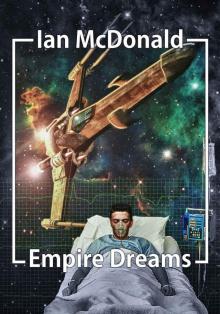 Empire Dreams
Empire Dreams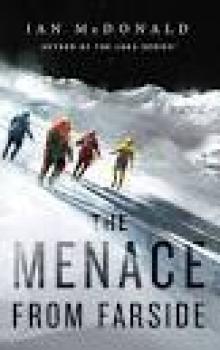 The Menace from Farside
The Menace from Farside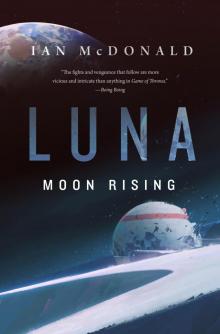 Luna: Moon Rising
Luna: Moon Rising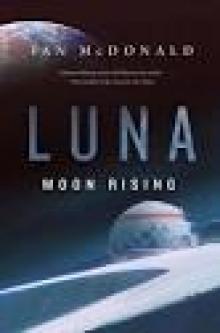 Moon Rising
Moon Rising Desolation Road dru-1
Desolation Road dru-1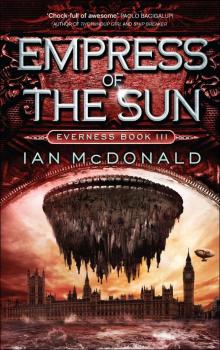 Empress of the Sun
Empress of the Sun Ares Express dru-2
Ares Express dru-2 Tendeléo’s Story
Tendeléo’s Story River Of Gods
River Of Gods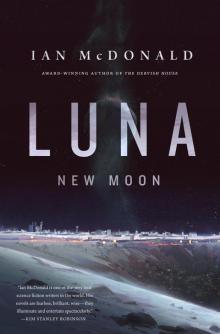 Luna
Luna![Cyberabad Days - [River of Gods 02] Read online](http://i1.bookreadfree.com/i1/03/29/cyberabad_days_-_river_of_gods_02_preview.jpg) Cyberabad Days - [River of Gods 02]
Cyberabad Days - [River of Gods 02]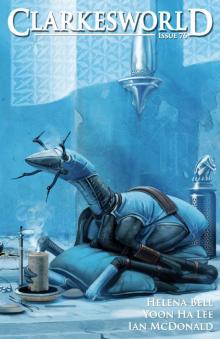 Clarkesworld Magazine Issue 76
Clarkesworld Magazine Issue 76 Brasyl (GollanczF.)
Brasyl (GollanczF.) Scissors Cut Paper Wrap Stone
Scissors Cut Paper Wrap Stone Chaga
Chaga Time Was
Time Was Cyberabad Days
Cyberabad Days Be My Enemy
Be My Enemy Changa
Changa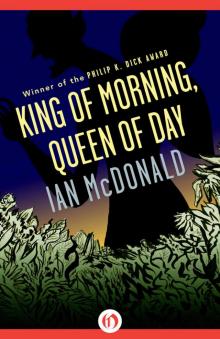 King of Morning, Queen of Day
King of Morning, Queen of Day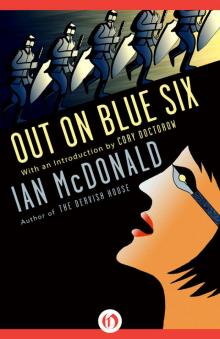 Out on Blue Six
Out on Blue Six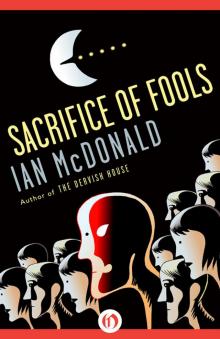 Sacrifice of Fools
Sacrifice of Fools Desolation Road
Desolation Road Luna--Wolf Moon--A Novel
Luna--Wolf Moon--A Novel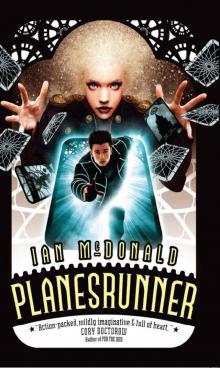 Planesrunner (Everness Book One)
Planesrunner (Everness Book One) Ares Express
Ares Express